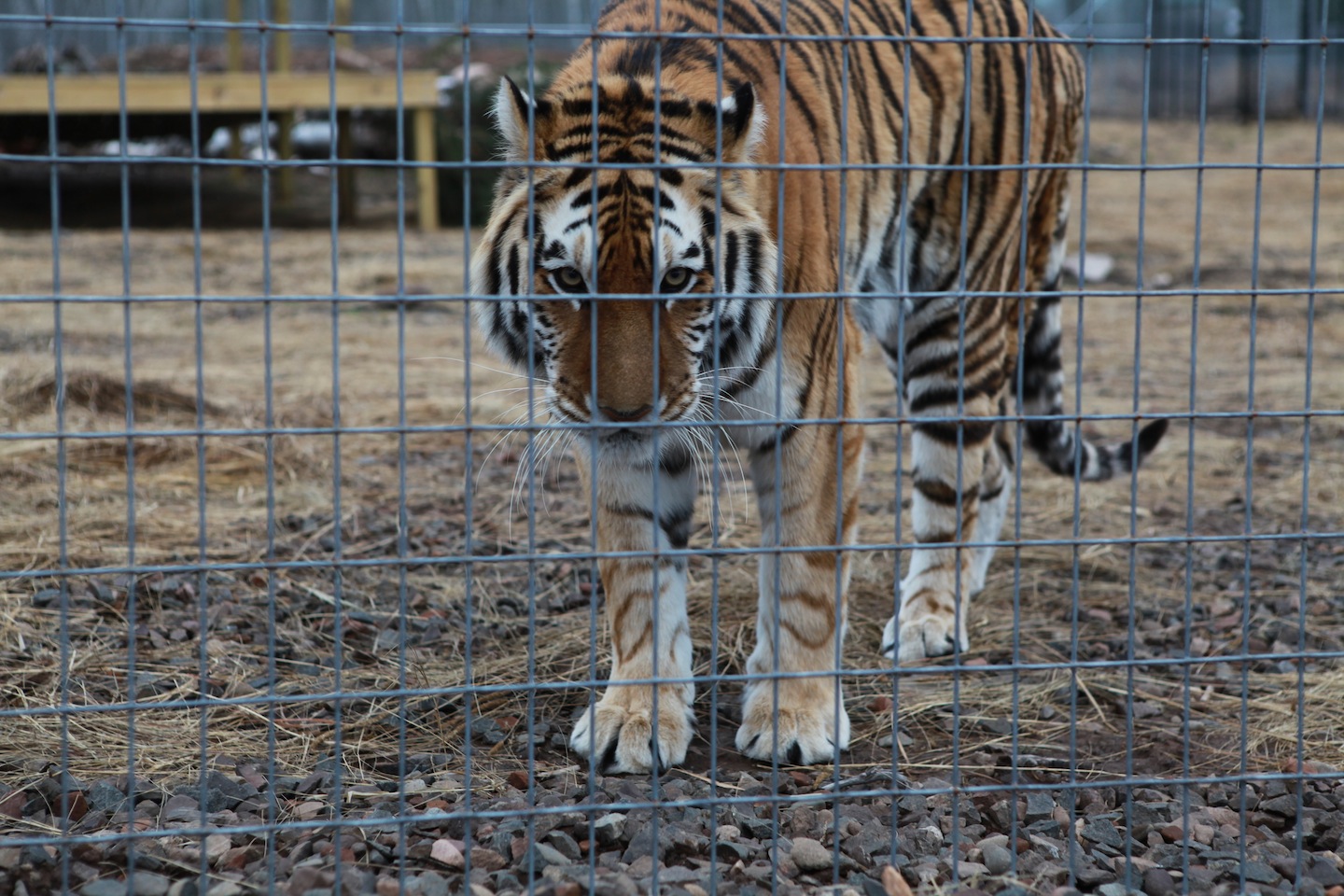
A rescued tiger who has found a new home in The Wildcat Sanctuary in Sandstone, Minnesota. Photo: © IFAW
Big cats don’t make good pets but you might be shocked at how many of these magnificent animals are being held in captivity in private homes, often living in atrocious conditions that not only endanger their lives but those of people in the surrounding community. As Beth Allgood, the International Fund for Animal Welfare’s U.S. country director wrote in a recent op-ed, “It is estimated that there are more captive tigers kept in the United States than there are roaming free worldwide….Unfortunately, we don’t know the precise numbers of big cats — lions, tigers, leopards, cougars and others — in private hands in the United States, because of woefully inadequate federal regulation.” However, a bill being put forth in Congress (The Big Cat Public Safety Act–H.R. 1380) could help protect big cats and the law enforcement officers that are often tasked with responding to emergencies involving the animals.
Beth went on to explain that, “many of these big cats are kept as private pets, often in inhumane conditions, by individuals who do not have the resources or training to care for these deadly animals. From backyard exotic pet collections to cub handling and photo-op displays, the extent of private ownership of big cats in the country is alarming in magnitude, strikingly unregulated and virtually unrecognized by the general public.” Enacting legislation to register big cats with U.S. Fish and Wildlife Service and crack down on animal rights abuses will not only restrict private ownership of these animals but can also put an end to the big cat “pet” trade. This registration will also help law enforcement, state agencies, and first responders to know where big cats are being kept so that they can be better prepared and prevent injuries and death that can result from these apex predators.
H.R. 1380 can also prevent the death of big cats as when they escape from the unsuitable facilities they’re kept in, they are often killed, as first responders have few options under these dangerous circumstances. The bill would also require that facilities that are permitted to raise and keep big cats be legitimate sanctuaries or exhibitors licensed by the U.S. Department of Agriculture (USDA) and operating with adequate barriers or distance between animals and the public.
Why This Matters: Big cats like lions and tigers don’t fare well in captivity as they require a lot of space and an amount of food comparable to what they would eat in the wild. For instance, one tiger in captivity can cost as much as $10,000 a year just to feed. It’s for this reason that went the cats are kept as pets they’re often malnourished and end up living in basements or backyard kennels. Additionally, private ownership of big cats poses a risk to human life and in recent years, dangerous incidents involving captive cats has resulted in 20 human deaths (including 5 children), 265 maulings, 285 escapes, and 149 big cat killings. What’s worse is that owners of these animals often abandon them and have little concern for the plight of their species. H.R. 1380 is a bipartisan bill and hopefully can demonstrate that protecting endangered animals from abuse is something we can all agree upon, even in a partisan political climate.
restrict private ownership of big cats and bring an end to the trade in “pet” tigers, lions, and other big cats.
Tigers, for instance, are 500-pound carnivores that cost as much as $10,000 a year just to feed and require huge spaces to roam. Many tigers and other big cats in the U.S., however, live their entire lives in basements, backyard kennels, or even in apartment buildings. When big cats escape from such unsuitable facilities, they are often killed, as first responders have few options under these dangerous circumstances.
Just as direct contact threatens the health and safety of cubs, it jeopardizes human health. In addition to scratches, bites, and other injuries, numerous pathogens can be passed between big cats and people, including ringworm, roundworm and other parasitic infections, bacterial infections, and rabies.
In recent decades there have been at least 740 dangerous incidents involving captive big cats across the U.S., including maulings, escapes, confiscations, situations in which big cats have been killed, and—alarmingly—cases in which captive big cats have killed people.7 These incidents have resulted in at least 20 human deaths (including 5 children), 265 maulings, 285 escapes, 149 big cat killings, and 133 confiscations.8 In addition, private owners of captive big cats have sought to surrender or abandon at least 1,297 big cats since 1999.9 The actual number of unwanted big cats is likely much higher, as this figure accounts only for the number of big cats about which a single rescue was approached during these years.10
H.R. 1380 would require that facilities that are permitted to raise and keep big cats be legitimate sanctuaries or exhibitors licensed by the U.S. Department of Agriculture (USDA) and operating with adequate barriers or distance between animals and the public.
By requiring big cat owners to publicly register their animals with the U.S. Fish and Wildlife Service, H.R. 1380 will ensure that state agencies, local law enforcement, first responders and the surrounding community can access information about where dangerous big cats are being kept. It will avert unnecessary human suffering, deaths and injuries from these inherently dangerous animals.


